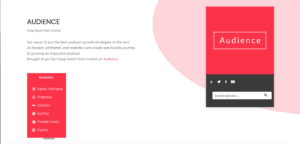Welcome to Castos Office Hours, our weekly webinar focused on answering your most pressing podcasting questions live. Everything from gear, launch plans, audience growth, to Castos feature updates, we’re covering it all!
We kicked off our second webinar with an overview of nine strategies to promote your show, from social media to how to leverage your own network of fans. Then we jumped into our live Q&A, answering questions about what materials you should provide to guests before they come on your show, why your podcast should have it’s own standalone website, and how to define a consistent posting schedule plus what to do if you fall off track!
Check out the full webinar below for every last detail or our summary of what went down.
Podcast Guest Questions
I feel intimidated reaching out to larger podcasts to pitch being a guest. What should I do?
First, don’t feel intimidated pitching yourself as a guest on someone else’s show. You have a lot of offer as a podcaster and will add diversity to their show which is a win/win for everyone. For pitch requests, try implementing a new strategy. Rather than immediately going after the “big guys”, pitch other podcasts that are similar or slightly larger in size than yours. Lead with how you can complement their episodes and why your voice is unique. Working with peer podcasts will allow you to book more appearances that can then be used to highlight how great you are as a guest when targeting larger shows.
What materials do you provide to guests on your podcast beforehand?
Providing your guest recording tips ahead of actually hitting the red button is where you should start. Recommend recording in a closed space, free from errant background noise, and make sure you’re on the same page with what recording software you’ll use. Sending an episode outline can be helpful to give you guest a quick overview of what you plan to cover. But be warned, an in-depth outline may reduce the spontaneous conversations that often make podcasts memorable. Trying to “stick to the schedule” could also limit how long you and your guest speak about a topic that ends up creating the best content.
Podcast Website Questions
Why does my podcast need a separate website?
There are a lot of benefits to committing resources to a podcast website as it’s the actual home base of your show. Your site is a central meeting point where you can easily direct your audience to find more information about an episode or even an upcoming tour date. Your website is also the perfect place to publish your show notes, episode transcriptions, and links to resources you mentioned within an episode. Each of these pieces provides SEO value later on when potential listeners search for a podcast like yours! We recommend using WordPress to create your website because it integrates seamlessly with our Seriously Simple Podcasting plugin. If you already have a Castos account, you can easily hook to two together and manage your podcast episodes and website directly from your WordPress dashboard. No toggling between two platforms, saving you time to focus on your show.
Podcast Consistency Questions
What’s the right episode volume? How many episodes should I publish per week or month?
In order to launch, we recommend having at least 2-3 episodes recorded and ready to go. This allows you to better hook your audience, once they enjoyed listening to your first episode they can immediately dive right into the next. After your show is live, consistently publishing at least 2x per month is the minimum we suggest. Anything less than this and you may risk losing listeners because they can fill their time consuming other shows that have more content. The key here is also consistency. Your audience is relying on you to publish new episodes on a reliable schedule and it’s in your benefit to become part of their routine!
What should I do if I’ve fallen off my consistent posting schedule and want to re-introduce new content?
There are two avenues you can take here and the right answer depends on you and your show. If your new content builds off of the content you were publishing before, you can explain the break in your next episode and detail when the audience can expect the next new episodes. If your new content is different than your original concept, this might be a good time to start a new series and tell your listeners about the awesome new path you plan to take the show.

